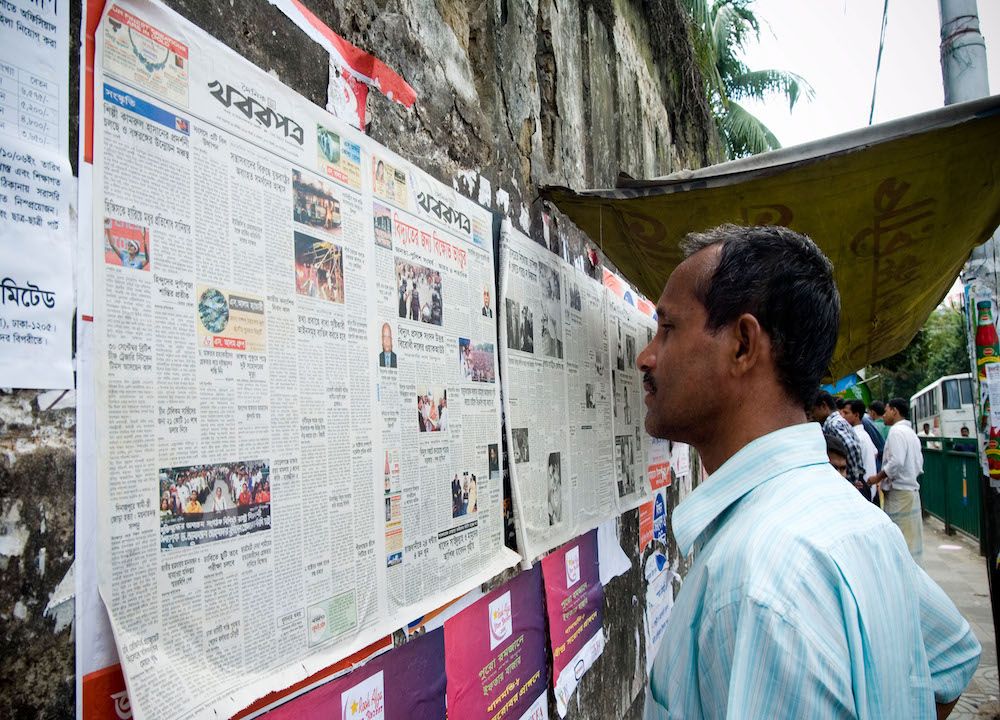The cost of independent journalism in Bangladesh
The author explains that he is leaving his editorial position at Netra News, proud of what it is achieving.

It has been a great journey, but this month I leave Netra News as the editor of its English language output. I will continue to contribute some articles — I will keep my hand-in, as they say — but my centre of gravity will now move away from journalism on Bangladesh and focus elsewhere.
There are several reasons for my decision, but I think it is important to mention that a significant one involves the blow-back on my family in Bangladesh as a result of my co-editing a media platform that is regularly critical of Bangladesh government’s policies on human rights, governance and democracy, and which seeks to uncover the substantial corruption within the country’s ruling business and political elite.
Bangladesh’s current Awami League government is no longer comfortable with freedom of speech, and it does not take criticism easily. Indeed, the longer it remains in power, the more censorious it is. It is true that since the country’s independence, all governments have at some level been at war with independent journalism and journalists, but the situation is particularly dire now. Those who cross a particular line, often suffer serious repercussions — and many journalists in Bangladesh have in recent years been threatened, or arrested.
Since 2017, I have lived outside Bangladesh (as after 13 years of living inside the country, the government did not permit me to stay any longer) and therefore I have managed to escape the worst of government intimidation. As a result, it was my family back in Bangladesh — even though they had absolutely nothing to do with anything that I wrote — that suffered the impact. For too long, they have had to put up with being innocent targets of the government’s annoyance at my role in Netra News (something faced not just by my family, but by many other families of those writing from outside Bangladesh). With me leaving Netra News, I do hope that this will now stop. And perhaps, in time, government authorities may even give me a visa to visit them!
Because Netra News’ output has been generally critical of the current government, Awami Leaguers think that Netra News is a partisan media outlet. That is not the case. Netra News started publishing at the end of 2019, with the Awami League in power for nearly 11 years, and the party has continued in power since then. Had the Bangladesh Nationalist Party (BNP) been in government, pursuing the same authoritarian policies as the current government, Netra News would have produced the same kind of journalism as it does at present, but with the BNP (instead of the AL) in its crosshairs. I have no doubt that Netra News will continue to seek out and expose corruption, poor governance, and human rights violations regardless of which government is in power, following the evidence wherever it may lead.
It is important to remember that Netra News was established in the context of the shrinking media space within Bangladesh, seeking to publish articles that the country’s media could not publish. With the Information and Communication Technology Act of 2006 and then the Digital Security Act of 2018, the country’s domestic media began self-censoring to unprecedented lengths, fearful of government harassment and became much less willing to publish stories critical of the government on sensitive issues.
Based outside Bangladesh, and without the kind of risks faced by local independent media, Netra News could produce the kind of stories that local media were unable to, and were from the very beginning quickly seen as a threat to the government. The day after the website was launched, with articles about alleged ministerial corruption, enforced disappearances involving the prime-minister’s advisor, and about the role of the Rapid Action Battalion (RAB) in the Chittagong Hill Tracts, the government blocked the site in Bangladesh.
Since then, people in Bangladesh have primarily only been able to access Netra through its mirror website, or through Facebook and YouTube. Despite the government’s attempts to limit access to Netra News, the media platform has on occasion been able to capture the national conversation with startling exposes - one of which has been nominated for a major journalistic award - or even straightforward analytical commentary. Even if its articles have not always broken through into the national conversation, it has in its three years, with its minimal budget, published fact-based strong critiques of government policies or their questionable activities, while pointing, whenever warranted, to areas where it has succeeded.
Netra News has always been transparent on its website about who funds it, which is currently the National Endowment for Democracy (NED). This is a non-government, bipartisan, US-based organisation, funded by the US Congress (not the government) that acts as a donor to hundreds of pro-democracy civil society organisations throughout the world, many of which are in Bangladesh.
NED funding allows Netra News to just get on with its work of independent journalism, imposing no restrictions or direction in what stories it publishes. That is the great advantage that Netra News has over most Bangladesh media platforms: it has no corporate or politically partisan ownership. It just publishes good, accurate, evidence-based public interest reporting and analysis. For this, it — and those involved or connected someway with it — are attacked on social media and disinformation websites which are controlled by government agencies or pro-government propagandists. This is the price that one has to pay, unfortunately.
It is the end of my story at Netra News, but I have no doubt that with new blood it will continue to publish outstanding investigations and incisive commentary. I wish it the very best.●
David Bergman (@TheDavidBergman) — a journalist based in Britain — has been Editor, English of Netra News since the platform was founded in 2019